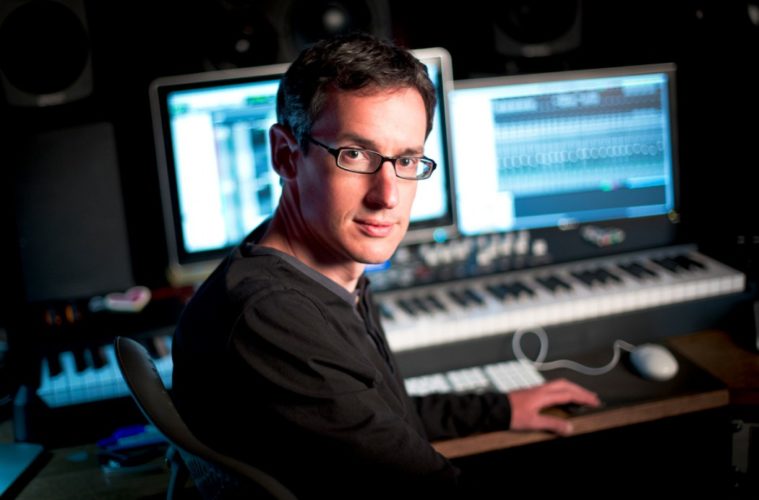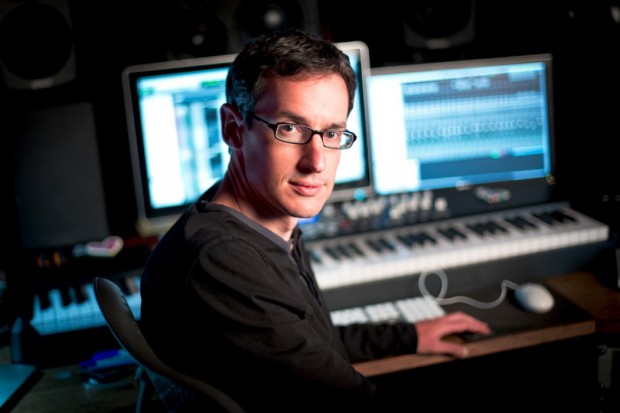
In the second half of 2013, British film composer Steven Price made quite a name for himself. He scored two very popular films, Gravity and The World’s End, which were both commercial and critical hits. Once the dust of awards season settled, Price found he had walked away with some of the most coveted honors including the Academy Award for Best Original Score for Gravity. Alfonso Cuarón‘s space fiasco film was an amazing cinematic achievement, but it was Price’s ethereal and abstract musical accompaniment that truly helped make Gravity an unforgettable experience. We recently sat with Price to discuss his latest work, David Ayer‘s harrowing WWII film Fury. Check out our conversation below, which includes a full stream of the score.
The Film Stage: You once said you work in “an unpredictable industry”, and, further, that it’s really all about catching a break and hoping something comes your way. How have things changed for you now that you’re an “Oscar winner”?
Steven Price: Well, it’s always a challenge because we’re all trying to do the same thing, which is to make something out of nothing, and do the best we can at it. It’s not that easy. [*laughs*] But that’s half of the fun of it for me really – the idea that in a few months time you’re going to be trying the next challenge. But I’m really lucky to be doing what I’m doing – I get to make music and play instruments all day. [*laughs*]
Excellent. Well, a belated congratulations on your win for Gravity. How long did it take to come down from the hype of awards season? And what were the first couple things you did after coming home with the award?
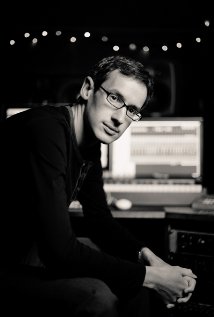 Well, there really wasn’t time to unwind because I came home to a mountain of work. I was already involved in the TV series called Believe which is something Alfonso Cuarón had devised with J.J. Abrams. I came back and basically was faced with turning in more music than I’ve ever written in a very short period of time. I basically landed on a Tuesday and had to deliver something almost four days later. So there was no time which, I think, for me, was probably a good thing. [*laughs*]
Well, there really wasn’t time to unwind because I came home to a mountain of work. I was already involved in the TV series called Believe which is something Alfonso Cuarón had devised with J.J. Abrams. I came back and basically was faced with turning in more music than I’ve ever written in a very short period of time. I basically landed on a Tuesday and had to deliver something almost four days later. So there was no time which, I think, for me, was probably a good thing. [*laughs*]
I was already involved in Fury by then as well so really, until about two weeks ago, I haven’t really surfaced for air. It’s been a busy time, but it’s been nice to keep working instead of just staying home and staring at your Oscar all day. [*laughs*]
So that thing must be getting pretty dusty then huh? [*laughs*]
Actually, the award lives at my parents house now. I thought it was only fitting that they get to hold on to it after having a musical son for ages. [*laughs*]
I’ve spoken to a few composers who have told tell me that TV can be a non-stop grind. But what is your experience like on Believe?
Well the pilot was done with Alfonso Cuarón in April of last year, and I got into the thick of it at the end of the year. It’s kind of nice at the beginning when you’re getting started because there’s time some to create and develop the sound. But then, very quickly, you reach this terminal velocity where literally, every week, you are producing a lot of music. Now I, in my ignorance, went into it thinking “how much music can there be?”. There are some shows out there that are hour-long episodes which require 55 minutes of wall-to-wall music…and of course that’s the one I’m get! [*laughs*]
So, it was a lot of work but also a lot of fun. I got to do a lot of incredibly percussive stuff, and a lot of hitting of dustbins, metal cans, and all these oil cans which were put together to make this really propulsive score. They were balanced with a lot of ethereal sounds. I also got to play a lot of guitar, so that was a really welcomed release after doing Gravity. On that one, Alfonso and I established a very specific set of rules that we used to create new and interesting sounds. But Believe is a lot of work and so they’re right, television is more of a constant grind.
I very much like the film score process which is something that lets you write and develop and play it back with chances to revisit it along the way. Now in TV, there’s certainly no time for that. It was very much write it, record it, polish it and, oops too late…we’re on to next week’s show…here’s your next set of rushes!
It was quite extreme and I have the greatest respect for these people who do amazing work on TV writing in such continually tight time frames. And they may be doing two or three shows concurrently. *laughs* So I suspect they don’t sleep at all. [*laughs*]
Attack the Block, The World’s End, Gravity, and now Fury. You’ve pretty much got the market covered on unique sounds and atmospheric scores. This film, like the others, is very non-traditional and uses a lot of electronic instruments, and synth sounds set against some orchestral work. So what made you want to score in a similar fashion even though this is a historical picture?
The sound and style I now gravitate towards really came together at the same time. It is only recently that I have begun to trust my own instincts and I resisted the temptation to approach my projects like they were traditional scores. Honestly, I was never very good at that, sounding like anybody else or any traditional genre, so the realization that it’s not a problem to do things differently really helped set my mind at ease.
It made me understand that sounding like yourself is ok too. You don’t have to use a 110 piece orchestra because that’s what other composers have done and what people expect. Then, the more you trust yourself, the more you can explore. Ultimately your artistic quest becomes more like self-discovery and not just a job where all you’re doing is finding out how best to put music to picture.
So that was a huge revelation for me, and then, all of a sudden, all these opportunities started to come my way. Attack the Block needed a very fresh sounding score that would fit the tone and the characters in it. With The World’s End there was very specific tone as well, and then, obviously, Gravity was one of the most unique opportunities for a composer.

Then that leads to Fury which is its own animal because it’s a very different way of looking at World War II. Director David Ayer was looking to tell a story that was an intense and brutal but one that examined the psychological aspects of these characters in a very honest way. So, each time I’ve come aboard a project I’ve been paired with directors who have been very happy for me to take a look at it and see what the film needs rather than what a film in that genre would need. They are open to my ideas and accepting of a fresh approach and that has been really rewarding. It’s everything I could hope for in a career really.
Fury is an incredibly unique score, it’s almost like “Gravity in a tank,” as it has a lot of parallels to Alfonso’s movie. David’s story of these characters who are equally in great danger and peril find that they are never truly safe. When you two were getting started, what kind of ideas did you and David throw back and forth before you landed on this hybrid between ethereal and orchestral themes?
We had a lot of conversations in the beginning, and they were very rarely about music. Sure, we talked about music, but it was really about emotions. We talked a lot about what the crew of the Fury tank had been through, and the fact of the matter is they have been in hell for four years. They are ground down, they are beyond exhausted, but they have to keep moving forward.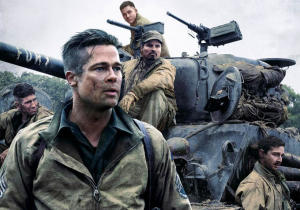
WWII was the first truly mechanized war, and machines were being built by both sides of with just one intent: kill the other people before they kill you. In a sense, whether working on, or watching the movie, you kind of get involved in a way that you quickly feel what these men are going through. It feels like you’re exhausted, it feels like your riding forward, but within that, there are these really damaged human beings, so the trick was to find this music that, like them, was kind of broken but also, somewhat, echoed their humanity. I tried to capture what David was shooting – these beautiful, but very horrific images and scenes – and for me, it was about finding the layers that represent the subtleties and subtext in the film.
You touched on humanity, and there are tracks like ‘This Is My Home’, and ‘Still In This Fight’, and you help us find compassion for these soldiers who are so desensitized to violence. They are hopeless and lost, but really, they are just trying to do their job so they can go home, alive if possible.
Well thank you Marc. That’s what we’re going for. I feel like I’ve been lucky to have worked with David. Going back to the beginning, David’s first words to me were, “I want to feel, I want the music to help the audience feel”. And as he was saying that, he would thump himself in the stomach, and go “I want that gutteral feeling to the music.” When I was writing, David would always give me a little more time to explore and try to get a musical idea to work. We had a really close collaboration and a good give and take relationship throughout. For a composer, that’s a really amazing thing.
One of the standout elements in the score is the choral work. Let’s talk about that, is that even a language?
Oh, yeah. Very glad you brought that up. The choral thing, for me, was the turning point in the whole process. I was working on one of the cues, and trying to get the sense of constantly moving forward, and I started using a choir for it. It was meant to be a sort of emotionless chanting that is very constant and no deviation  in pitch. I just wanted a very solid presence. But once I had that idea, it began to evolve in all different ways across the film.
in pitch. I just wanted a very solid presence. But once I had that idea, it began to evolve in all different ways across the film.
Sometimes I changed it so the singers are just whispering, and you can’t really hear what they’re saying. I would record very close to the singers and then move the microphone around the room with the idea being that these soldiers are three weeks away from the end of the war, according to the timeline, and they are in Nazi Germany. They are surrounded in the most dangerous place you can imagine, and the choir is just constantly chanting. They’re actually chanting extracts from the Lutheran Bible that the Germans had translated for themselves.
In the session, I had an amazing choir who were watching the picture and as it played out I would literally point to a different passage from the Bible for them to sing. We would use passages that are incredibly fitting to the situation on screen. Things like “invaded lands”, or whatever it may be, and I just felt like it jelled with the film.
It was never designed to be heard, but it’s just always there – this Germanic presence that is almost taunting them. Many times the words are entirely inaudible. To achieve that, I would give different passages to the choir. So, one half would sing something and the other half would sing something entirely different. It really made it feel like the sounds are coming from all around you and I have to say it got very eerie when we were recording it. The first time I did it I wasn’t sure it was going to work, but in the sessions we got them to whisper and everyone in the control room just shrunk in their chairs. We all looked at each other and went, “oh, that’s quite spooky!”.
The score isn’t tailored to the film in an expected way, and, in that sense, it kind of mirrors what’s happening to Wardaddy and his crew. So, because the audience doesn’t know how, when, and where the score is going to come at them, it’s as unrelenting as the visuals. How did you and David Ayer decide on the balance between what was overpowering on screen and what was overpowering in an auditory sense?
Repetition in the scoring process goes a long way in developing the right sound. Many times you can get hung up on few seconds here, or those few seconds there. But when you watch the film over and over again, in its entirety, you get a better idea of the whole picture, it helps you develop a sound that is better suited to the overall themes. That helps keep you from getting stuck on one specific scene or sequence.
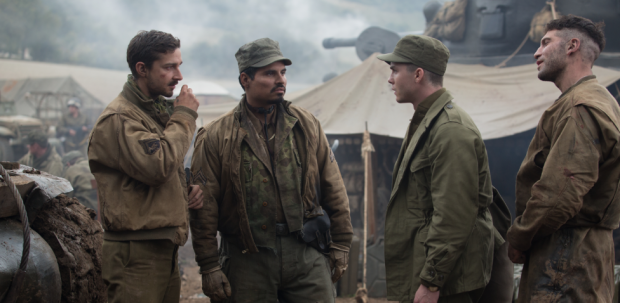
That also really helped us figure out and decide what scenes we could tone down, or ones we could hold off a little longer before we really came on strong. Since we were, many times, speaking for the characters, we wanted to make sure we were conveying what they were going through.
Now there was a lot of trial and error, and we certainly didn’t get this on the first take. But one of the blessings of being involved very early on, and longer than what is traditional on a film score, is that you get a couple of bites at the cherry. You’re given time and opportunities to correct things if you have the balance slightly off. I think that’s tricky to do, because in Fury, we’re dealing with people who are facing intense mental and physical exhaustion. Within each of these tired soldiers there’s a character. We have to really work hard to identify what that is and there was a lot of energy spent and ideas tried just to figure that out to get it just right.
Well it does come across as the voice and the soul of these worn-out soldiers. But that’s another thing that the score did – it never went on heroic runs because, obviously, that was not the intention or message of David’s story. But a lot of people’s hands are at work on a score – you have input from the director, and the producers – so whether or not it was the case on Fury, how often are you given comments or input that really made a difference in the final product?
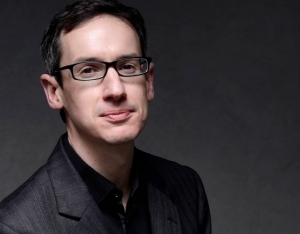 Well there’s always something like that on every project because this is such a collaborative profession. I’ve been doing this for a while, about 17 years now, and I’m always wondering, “When is our turning point going to come?” You know, it’s that situation where I’ll get the idea or suggestion and then at 3 in the morning I’ll go, “That’s it! We need to do this!” Or sometimes, far later than you wanted it to happen, there’s a picture cut that changes everything and you realize that you have to rewrite everything but, luckily, it’s for the better.
Well there’s always something like that on every project because this is such a collaborative profession. I’ve been doing this for a while, about 17 years now, and I’m always wondering, “When is our turning point going to come?” You know, it’s that situation where I’ll get the idea or suggestion and then at 3 in the morning I’ll go, “That’s it! We need to do this!” Or sometimes, far later than you wanted it to happen, there’s a picture cut that changes everything and you realize that you have to rewrite everything but, luckily, it’s for the better.
So there’s always a little trigger that can take you somewhere unexpected. And sometimes it’s not even the music, it’s a note about a character, or something like that. Or a director might say, “Hey, would it be nice if we felt something like this, in this way?” and then I’ll go, “oh yeah! I can help that!” Then I’ll run up to the studio to try to solve the problem.
Some composers I’ve talked to have found that recently their career, in a way, is moving toward sound design and sound engineering as a way of making truly original sounds. It’s becoming a more fulfilling next step after they’ve done so many projects. So when you’re not working with strings or choir, and you’re doing more atmospheric and electronic stuff, do you work on those elements by yourself, or do you have a team of electronic musicians helping you develop and create your unique sounds?
I’m actually entirely self-contained at this point in my career which is why I look so tired. [*laughs*] But I really love that process of developing an entire pallet for a film or project and finding sounds that really feel like they belong to the film. Because I got involved so early on Fury, I asked the sound team to record a bunch of source noises. They went out and when they were done, I was given this hard drive with all manner of things. For instance, I had a number of sound files that were tank shells being banged around on and inside tank. There were also sounds of the tank moving, and gears changing, and all these sort of noises that I could kind of derive music from or manipulate, layer, etc.
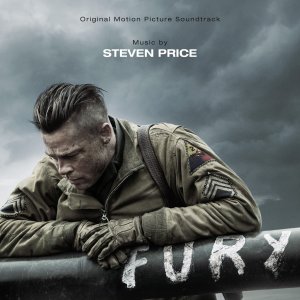 The first sound you hear in the film is actually the sound of dog tags. We had a bag of those and that cue is just my hand going through the bag. I slowed it down and played it in very odd ways so you can’t tell that it’s dog tags, but it’s got a quality to it and it helps make it unique. I love that process. I pulled some of the more traditional music out of the film and then I added my own sort of elements to it and then put it all back together. You know, I can’t imagine not doing that all myself, and I find it a really crucial part of the process. It’s really inspiring. So often I listen to a sound, whatever it is, and that might lead me to develop a harmony. If I follow the trail, or my instincts rather, the next thing you know, you have a cue. So for me the, organic and the electronic parts of the score are all the same to me and I love working with both.
The first sound you hear in the film is actually the sound of dog tags. We had a bag of those and that cue is just my hand going through the bag. I slowed it down and played it in very odd ways so you can’t tell that it’s dog tags, but it’s got a quality to it and it helps make it unique. I love that process. I pulled some of the more traditional music out of the film and then I added my own sort of elements to it and then put it all back together. You know, I can’t imagine not doing that all myself, and I find it a really crucial part of the process. It’s really inspiring. So often I listen to a sound, whatever it is, and that might lead me to develop a harmony. If I follow the trail, or my instincts rather, the next thing you know, you have a cue. So for me the, organic and the electronic parts of the score are all the same to me and I love working with both.
Well, I love your music, and when I say it’s directionless, I don’t mean it as an insult. I mean that I like how it can go in so many different ways. There doesn’t seem to be a beginning, or an end. Sometimes I’ll be listening to a soundtrack, and I’ll get the notion that it’s going to end, but with your work that’s not the case. Other times, a track might sound like the score is wrapping up or getting to the credits, but if I listen to Gravity or Fury I’ll look over and find I’m not even halfway through the the track list. Your music makes it easy to get lost in the music.
Oh great! That makes me really happy to hear you say that. I put a lot of time into the CDs, and I really like putting them together. I’ve been very much a proponent of keeping things on the CD in film order as opposed to changing them all around. My main goal is to make the CD honor the film in a way and let that tell a story – just like we do in the film. So I like that people actually listen to them. [*laughs*]
Fury now in theaters. Listen to the full score above.

